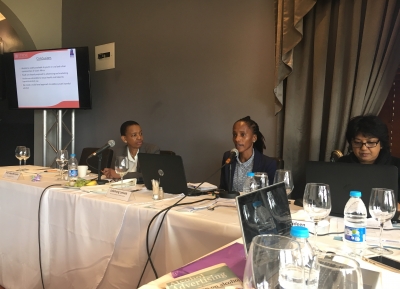
Soul City Institute briefed journalists in Johannesburg on the findings and implications of their youth and alcohol study. The research is one part of STRIVE’s multi-country alcohol and youth study which seeks to understand alcohol marketing, related drinking patterns and sexual health risks, particularly from the perspective of young people.
Soul City advocacy manager, Savera Kalideen, chaired the 22 February 2017 briefing which was introduced by Lebo Ramafoko, CEO of Soul City. Ramafoko's presentation highlighted the importance of addressing alcohol as an uncontrolled drug and emphasised that alcohol advertising has normalised drinking in dangerous ways. She stressed that the alcohol industry is determined not to be regulated, despite international evidence that self-regulation does not work.
Researcher Lebohang Letsela presented key findings and policy recommendations. She emphasised that youth in both rural and urban settings are heavily exposed to alcohol advertising outside most alcohol outlets. Youth reported that adverts were enticing and appealing.
“It seems like this thing is nice. So, you want to go for it and taste this thing and once you taste, you will end up being drunk and you want to do that forever. So, advertisements are the ones that bring us to alcohol or lead young people to alcohol.” Youth interviewed
The study found that young people have easy access to alcohol through a high density of outlets, many of them less than 500 metres from schools. Proprietors often allowed youth to enter without checking their age. Low prices combined with promotions and specials further facilitated youth drinking.
The study documented ways in which youth were vulnerable to several sexual health risks as a result of drinking, including unprotected sex, transactional sex and sexual assault. Letsela noted the importance of shifting responsibility from the individual level alone and, instead, pushing for structural measures such as reducing alcohol advertising and marketing, increasing alcohol pricing and decreasing the numbers of alcohol outlets. Young people need more supportive environments if they are to make healthier choices.
Professor Neo Morojele, Deputy Director of the Alcohol and Tobacco and Other Drug Research Unit and the Medical Research Council, presented findings from a quantitative study on alcohol as part of the International Alcohol Control Study. The findings echoed those of the Soul City study, establishing that youth in Tshwane – a large urban area in Gauteng Province – are heavily exposed to alcohol advertising on TV, in cinemas and on shop signs. Several questions were posed to the presenters and further individual interviews with media representatives were held after the official event.
Five years ago the cabinet approved the gazette of a draft bill banning alcohol advertising. However, the bill has yet to be legislated. The Soul City media briefing led to the study results being published in many prominent news outlets The STRIVE study builds on Soul City's longstanding work on alcohol and contributes to efforts by groups such as the Southern African Alcohol Policy Alliance to support public-health oriented legislation.
Read more information in the related policy brief.
News coverage

The Cape Times: Alcohol ads luring SA youth to drink
Eyewitness News: Urban and rural youth heavily exposed to alcohol advertising
Cape Talk: We don't have to have alcohol ads says Soul City Institute
Health E-News: Link found between drinking and sexual behaviour
SABC News: Alcohol and advertising influences youth



